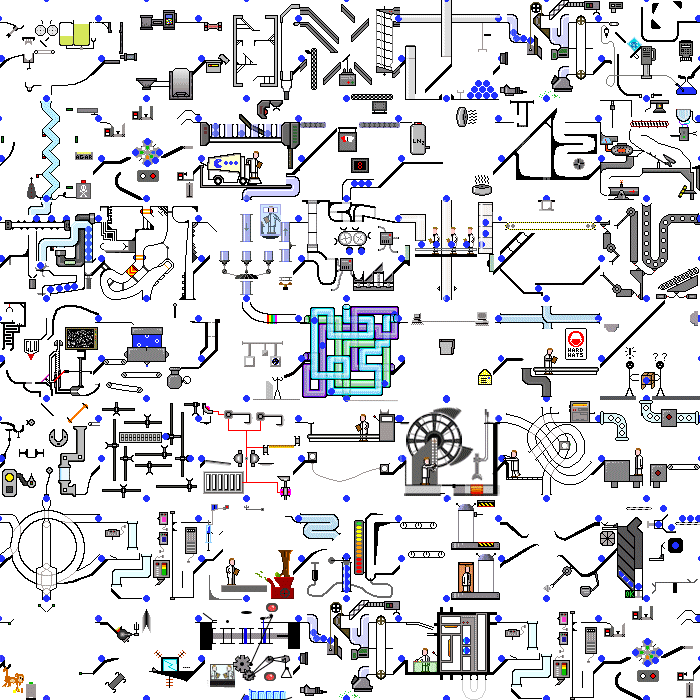Militantresearch
Thanks for drawing my attention to this volume!
Militantresearch
Thanks for drawing my attention to this volume!
newdangerousclass”
I love thinking about the "new dangerous class" in comparison with the "imagined community" of the five page essay mentioned earlier. What forms of learning and communicative practice might produce the community able to liberate itself? If we controlled the tools, what would we make?
Whatevertheirdisciplinarytraining,however,precarityintermsoflabor,debt,climatechange,citizenshiphasnowbecomethe“stateofexception”(Agamben)forstudents.
This is powerful. Higher ed and grad school often train as if precarity is not an issue. Certainly, undergrads might choose certain majors in hopes of job security and grad programs often offer professionalization workshops that aim to prepare students for difficult markets or even career alternatives. But the content and methods of education still carry on as if precarity is simply a bad dream that need not affect its core aims and processes. What would it mean to change the methods of education -- especially a humanities education -- to prepare students not only to adopt to precarity (if that's even possible) but to consider how to reverse it. It seems Larry and Jeff are both doing exactly this in their teaching, but I appreciate considering these methods in this new economic light.
thethreetofive(orten)page“typed,”doublespacedessay.Whatdoesthetextualityofthisgenreimplyaboutstudents,studentlearning,andknowledge?First,withitsuniformformatwhitepage,blackprint,andregularmarginsthethreetofivepageessayenforcesaruthlessstandardizationthatcorrelatesexpertiseandauthoritywiththematerialityofthecodexbook.Second,thisstandardizationunderwritestheimpersonalityofknowledgeanditsdivorcefromexperience;wewantstudentsto“own”theirlearning,yetweofferthemdocumentgenresthatrelentlesslymitigatepersonality.Finally,thisasceticregimeexpelscreativityfromthelevelofthesignifier,anironyforfieldsdedicatedtothestudyofhumanexpressionandareflectionoflargerinstitutionalanddisciplinaryarrangements.Inotherwords,ifwethinkofeverystudentessayasaritualofmembership,weneedtoconsiderthekindofcommunityimaginedbythethreetofivepageessayandthepriceofthismembership
First Jeff's wonderful literary analysis of student writing, now your cutting social analysis of its form. I wonder if student assignments might benefit from a comparative textual media analysis as advanced by Hayles and Pressman (2013). I especially love your brilliant question at the end that asks what sort of community does the production of five page essays entail. To play on your words, I wonder if one could say that the community imagined is one that is literally imaginary given that the traditional paper does not take part in genuine dialogue. Behind this false image of community is in fact its antithesis: an individual under judgement.
weirdskills
The phrase "new and weird skills and dispositions" is so much more fitting than the oft-used "digital literacy skills." I may have to borrow.
adissidentpedagogyexploitsthepossibilitiesofferedbythenetwork
And perhaps this is where teaching and learning is so important -- helping students find those points of weakness in the system and use it it to their advantage. Which brings up the ethical elements of such work, too. Some exploit and use for harm and hurt. Others, for good. One never knows where a student will take such work beyond the classroom. We have faith in the good in the world ... and brace for the potential of bad.
Indeed,thepagesofmystudents’Scalarbookarerepletewithavarietyofmediavideo,sound,animatedgifs,imagesthatsignifyavarietyofrelationsironic,iconic,hypertextualtotheiranalysesandinterpretations
I'd be curious to know what the ratio is between student-created media content versus "found" media ... and whether that creative aspect was part of the expectation of the book production.

isthenetworkanenemyorallyoftheclassroom
Always a central question -- is the technology I am using to advance and expand the writing of my students also a door into privacy and data exploitation?

disruptorinterruptbusinessasusual
Business as usual that valorizes itself for being "disruptive"! Your project, then, is a disruption of "disruption."
InconnectingtheprecariousnessofnetworklifeandlaborinTransmissiontotherhetoricsandrealitiesof“uberization,”mystudentswerepreparingfortheirfuturemembershipinthe“newdangerousclass”oftheprecariat(Standing)
But thinking about Erin's argument, are they not training, by collaborating on an open platform, to resist the Uberization model, where laborers are atomized and casualized and discouraged from associating together?
Whatevertheirdisciplinarytraining,however,precarityintermsoflabor,debt,climatechange,citizenshiphasnowbecomethe“stateofexception”(Agamben)forstudents
Completely agree with the political frame around the pedagogical question of assignment structure, but I don't follow the relevance of Agamben here: what's "exceptional" about "precarity"?
Inotherwords,ifwethinkofeverystudentessayasaritualofmembership,weneedtoconsiderthekindofcommunityimaginedbythethreetofivepageessayandthepriceofthismembership.
I would add that the printed essay is basically a memo written for one's "boss" rather than a publication broadcast to a readership. When students "publish," even just to peers, they own their intellectual work in a different way via sharing it.
threetofive(orten)page“typed,”doublespacedessay
Amen, brutha! I love the "typed."
other,“scholarly”Scalarpagesbeforet
I love this focus on history of the material text to temper the technoutopian sense that we're now "doing things yet unattempted in prose or rhyme" when we should be historicizing new tech.
studentspracticedadeepformofactivereading,repeatedlygaugingandexplainingtotheirpeerstherelevanceofparticulararticlestogrouptopicsandquestions
I'm curious for more detail re: assignment design here. What did you do to guide this "deep" practice and keep it focused, especially for Ss not familiar with literary research?
usedgroupbasedgoogledocs
Man, this is a useful object lesson in why the scrappy .orgs and .edus in Erin's argument have such an uphill struggle! I'm not being sanctimonious: I use these platforms too every single term!
cognitivecapitalism
Not familiar with this term: gloss?
studentseagerlyembracedtheopportunitytoescapetheusualmediumforrepresentingstudentlearning
Selfishly, since my paper bitches about traditional litcrit pedagogy, I'm curious what the terms of their eagerness were...
takeKennethBurke’sfamousdictumthatliterature“betreatedasequipmentforliving”asseriouslyaspossible
I never realized how much Burke makes literature sound like an iOS app until I read this sentence. But he also said he thought a literature's value was "in keeping a society becoming too assertively, too hopelessly, itself." I'm interested to trace how the novel and your collective reading it/writing on it constitutes a kind of counter-engineering...
By way of conclusion, I would like to telescope out a bit and think about what this experiment, warts and all, suggests about pedagogy more broadly and especially about the teaching of critical reading and writing.
After reading reflections on the blog and browsing through the "Games," I have to say I am thoroughly delighted by this project and almost somewhat jealous I didn't participate myself! The lively "moves" were polar opposites from the strained writing you described in your first paragraph, and even the posts that described minor resistances to the project seemed to generate very thoughtful reflections on the processes of academic and literary work that I found interesting in their own right. I have many questions that I hope to discuss during our panel, but am grateful to have had a chance to read and explore the project site here.
Mantrapis a modest effort in the direction Rancièreadvocates: a radically egalitarian pedagogy in which knowledge and mastery are produced laterally among players rather than distributed radially from experts to students.
While Rancière has quite rightly drawn attention to the different social effects of these two different pedagogical styles, it would be interesting to also analyze them according to the knowledge transmitted or produced therein. How are these two different types of knowledge different in character, use, and effects, and is one always more desirable than the other? It is also worth considering to what extent radical egalitarian pedagogy requires the full rejection of expert. It seems, to nod to Jeremy's comment here, that expertise and hierarchy in itself are not being wholly rejected (as students draw on expert secondary sources and follow a syllabus that has been set for them) but simply authoritarian expertise in the form of a teacher. This tension came up earlier in the paper when a student expressed desire for a directing figure ("a dungeon master(!)") and I'm intrigued by the counter suggestion of "narrator." As we struggle to develop effective organizational forms of dissent, I think its worth entertaining different metaphors of leadership to think through what sort of model might be most fruitful in both the classroom and in the broader political sphere.
Those sharing roles were encouraged to share sources and notesfreely, exchanging the usual model of solitary research, with its attendant paranoid about plagiarism, for a model more closely resembling that of the science la
It's great to see how many different ways cooperation is encouraged in this course design. Sometimes I think the single greatest lesson of the individual term paper is that labor, thought, and reward are and should be isolating and individuating activities.
I collaborated with two librarians
Yay, collaborations with librarians!
students are in for frustrating wheel-spinning and instructors for frustrating dead ends.
If only there were a place for digital pedagogy wheel spinning and dead ends on the CV. Ha.
First, they needed to create a performance of the text that felt at least as satisfying as a good seminar discussion or close reading assignment. Second, they needed to gather sources that informed each move
Were students comfortable enough to dive in and reveal their creative "performances" to one another right away? I'd probably need to bite my fingernails for at least the first few weeks! If students were able to quickly achieve a playful, collegial spirit, I'd be interested in knowing what you think supports that dynamic. Class size? Existing familiarity? Luck?
they stretch and strain but fail to get there and often break a few jars along the way. The sheer distance between my students and the highly professionalized and specialized discourse they are attempting to enter is manifest in their adoption of a strange “elevated” voice, rich in obfuscation, slightly misused Latinate words, and malapropisms; the dutiful summary of several extant arguments in the literature with no original argument; the joyless pursuit of acrude but original argument with a few near-random cites from often irrelevant articles to fulfill the requirement to include X number of cites; and/orthe exaggerated reverence for the text, accompanied by superlatives applauding authors’ creativity and skill (“Melville did a fantastic job creating vivid characters in Billy Budd!”).
A literary analysis of student writing -- I love it! And one far more sympathetic in tone than its typical press on the #DisenchantedAcademics interwebs. I am fascinated with the phenomenon of what is often called--pardon me--"student bullshit" and am greatly interested in your investigation here into its structural causes and potential transformations.
I later had students spend an entire semester creating a free/open encyclopedic resource on the work of William Faulkner(Allred)
This is a remarkable class project. Looking over it, I'm struck by the extent and quality of research throughout the entries. If I was teaching this term, I'd have students produce a comparative analysis of this student-created wiki resource and the William Faulkner page on Wikipedia. And if I could, I'd pull some anonymous student papers on Faulkner from Turnitin to add to the analysis. How does the style, audience, incentive, and social and technical conventions differ in each of the three resources, and to what degree does this affect the knowledge produced and transmitted on each? I'd love to hear more about the process and experience at some point. Thanks for sharing.
think the “Dungeon Master” role is not workable in Ivanhoe but do wonder whether the instructor could play the role of “narrator” of the text, a positionality that would call attention in fruitful ways to the distinction between the “author” Melville and his third-person narrative, a
Would have undoubtedly changed the way we made our "moves"!
A player can initiate a “move”—a brief text written “in character,” so to speak—or respond to another player’s “move.”
A "move" - very reminiscent of table-top games! It is no wonder I so enjoyed being able to inhabit another character's shoes.
Ivanhoe concept invented by textual critics at the University of Virginia in 2000 and reconfigured as a theme for the WordPress blogging platformin 2015 by the Scholars’ Labat UVA(McGann).
On a fun note, after taking part in Professor Allred's Digital Humanities course and having the opportunity to participate in "playing" Melville's Billy Budd, I found myself getting more involved and more interested in table-top gaming like DnD, Dread, etc. Interesting side effect, I think!
having them think about literary research as a more lab-like, collaborative, and creative endeavo
Tricking kids into eating their vegetables so to speak!
they stretch and strain but fail to get there
Altogether too familiar with this myself!
I would add that the capacity for a single user to play multiple roles would open up the game
And if you had multiple players overlapping with characters, what would that lead to, I wonder? An interesting conundrum of how to use fixed points for a game of moving parts.

I wanted to capture some of the playful, collegial spirit of a tabletop game and require students to share the process of creating moves rather than just the products.
Reflective stance and writing and sharing is no doubt the most important way to make the learning of this kind of project visible -- teaching them how to step back from the playful nature to recognize what is really happening.
to capture the voice of the role in writing
I can see this as important here - for a player to be immersed in the character and the writing in order to be an authentic part of the game experience. Sort of like method acting...

you readers
Saying hi to you.

role-playing game (RPG)
Neat. Following links here to there, and back again.
often break a few jars along the way
Is the 'breaking of jars' a disruption that you don't recognize as authentic disruption? In other words, sometimes our students are making gains by pushing against our expectations in ways we don't legitimize because we don't see it in the right light of their world, only our world.

But if the point of these technologies is to prepare students to critically understand and act in our digitally-mediated world, then it seems that it is also our duty
Thanks, Erin: this is great stuff. As a closing point, I'm struck by the short-sighted fetish of comp sci in the academy and "teach yourself to code" in the culture more broadly. I think it's the role of DHers to put the brakes on everyone running for the "learn to code" bandwagon and refocus attention, as you do here, on the more critical and humanistic side of computing, the need to foster collaboration, self-determination, and autonomy.
Social Paper never achieved this utopian visio
Though it is integrated into the Commons, which is running a pilot this spring to incentivize instructors to use the Commons (with Social Paper and other open tools) as an LMS. So there's some diffusion going on here: maybe it's part of an archipelago of tiny utopias!
nfortunately these models have been largelyignored in the technological practices of higher education, thus directingtheuniversity’s technical, infrastructural, and social capitalto directlysupportcapitalist digital media companies’s broader monopoly on our technologicalimagination andthe globalproduction of digital tools, platforms, and services.
Not to be all Pollyanna, but I'm struck by the handful of remarkable successes out there: Wikipedia whupped Encarta (or whatever), WordPress whupped Blogger. And HTML, in the most dramatic example, conquered AOL in the early 90s. None of these successes were inevitable, all struggled with the same challenges of building user bases of folks willing to put up with less slick UI/UX to build them up. How/why did they succeed, and what do these successes have to offer us? I should also mention hypothes.is as a scrappy and so far successful story...
the “invisible discipline,”
Nice phrase. If it's not the name of a Bushwick-based postpunk outfit, it should be.
And without mass adoption (which is somewhat a result of these limited resources), they are unable to offer interactive access to a networked population, arguably one of the most valuable “features” of social platforms with massive user bases
Here, the academia.edu v. the various open commonses in the academy comes to mind. At CUNY, where we have an unbelievable commons, I guarantee more faculty have academia.edu profiles than profiles in our scholarly commons!
a genuine, popular, and sustainable alternative to capitalist digital media
Your argument reminds me that nonprofit/open resources have such a uphill battle in ways that are analogous to or really isomorphic with co-ops more broadly in late capitalism: for every Park Slope Food Co-op that thrives next door to Whole Foods/Amazon (for now, at least!), there are innumerable scrappy, idealistic small-scale outfits that lose: it's hard to convince folks to pay the tax, so to speak, of $$ and convenience to work within the nonprofit structure's limitations.
The Free Software Foundation, The Electronic Frontier Foundation, The Internet Defense League, Fight for the Future, Platform Coop, and Unlike Us
Can we get some links here? I know some of these players but not others.
rogressive, collaborative, student-centered, and publicly-engaged learning in the classroom (Kai-Wai & Kennedy 2013) as critical alternatives to institutional technologies that are often driven by management imperatives rather than educational principles (Stommel 2017; Watters 2014)
I'd like to hear more about the arguments you marshal here: which capitalist tech are counterposed to which ed tech options?
a rejection of capitalist digital tools and the important time-saving, collaborative, and networking affordances they offer, may feel equivalent to professional suicide
I'm thinking guiltily about my own use of GDrive with students. I do try to embrace open platforms/interfaces whenever possible, but Google is JUST SO GOOD at some things that are really boring and routine but important to workflow.
and the still emerging details of the fake news scandal of the 2016 U.S. election have helped draw public attention to some of these issues, there is still little sign of effective resistance or democratic redirection of these technologies formore fully human aims.
My Hunter colleague Jessie Daniels has a great piece on how social media has enabled white supremacist organizations: as you suggest, it's not just "not being evil"--it's creating the infrastructure that enables others' evil with nothing but hand-wringing and -washing as a response.
Ofcourse,amorecynicalreadermightclaimthatthisiswellandgoodbut,really,doesn’tallthisjustrepresentjobtrainingforthecognitariat,aninitiationintothecasualized,creative,collaborativeworkvaluedbycontemporarycapitalism.
I suppose one question we must ask ourselves as a panel is: what exactly are we each or collectively dissenting from? Erin's paper similarly argues for a dissent from contemporary [insert modifier(s)] capitalism. I read Jeff's (forgive me if I'm wrong, Jeff) as more concerned with dissent from traditional disciplinary protocols--also a concern here for Larry. Generally, how are these two breaks aligned or in tensions?
For me, I see the breaking from discipline here as plenty radical, though perhaps not revolutionary with a (err) capital "R," which I'm okay with.
RandyBass
Was thinking of Bass and this very essay in reading Jeff's paper...
Tosolvethisproblem,acoupleofstudentsandIhackedtogetherourfirstplatform,asimplebuteffectiveGoogleformanddatabasetocollect,share,andanalyzepopularandacademicwritingonUber.
Why not a private Hypothesis group?
Inageneraledcourse,moststudentsarealreadyunfamiliarwithdisciplinarywaysofreading,talking,andwritingaboutliterature.And,ifanything,theTransmissionUberprojectmadevisiblethecomplexliteraciesweoftenassumeinthehumanitiesclassroom.
Connects to Jeff's project for me: alternative, more creative, and better ways to teach traditional humanities literacies.
studentauthoredbook
(This PDF wouldn't allow me to select the text I wanted but anyway...)
Is this a networked form of expression? Using a kind of network to explore the concept of networks?
Wikipediaspawnsplagiarismandfakeknowledge
Why pick on Wikipedia still?
thesuburbsofSiliconValley
Meaning San Francisco?
league
A league? Cool!!

Finally, despite a growing air of suspicion surrounding capitalist digital technologies, there is still no clear consensus on where exactly to place responsibility or how one might meaningfully resist these technologies in ways worth the personal and professional sacrifice.
So important to acknowledge that despite our skepticism, there's good work and even pleasure to be had here.
a recognition that the way digital technology is shaping our collective existence is one of the most pressing humanistic issues of the day
Yes! DH really has to be about not just how digital tools can be leveraged in our humanities disciplines as they are but how the traditional study of the humanities bears on the advent of the digital in human culture.
somewhat paradoxically,
I'd like to dig into this supposed paradox a bit...Perhaps we need to focus less on platform and more on user agency and literacy. New platforms free of capitalism sound great. But can't we also train ourselves and students to be more savvy, resistant users of even mainstream technology?
The fact is institutions already spend millions on digital infrastructure with estimates that global ed tech spending will reach $252 billion by 2020 (EdTechXGlobal).
But if a university diverted its edtech budget to developing such a platform, would that budget also provide sustainability for that platform? Perhaps a consortium model would?...
a radically egalitarian pedagogy in which knowledge and mastery are produced laterally among players rather than distributed radially from experts to students.
A large part of me doesn't buy my own provocation here but: wouldn't it be more radical and subversive to do away with expertise entirely? Aren't we still reifying a certain mode of knowledge production here?
in ways that unfold within the often-ignored middle spaces between 200-level close reading skills and 400-level journal article-like engagement in ongoing critical debates.
I love this phrasing. Here's to further exploring these "middle spaces" (even those that precede close reading 101) through non-traditional assignments.
If the narrow goal is to improve the scaffolding that guides English majors from elementary exegesis to professional-grade literary research, the broader aim is to promote more horizontal, rhizomatic relationships among students, between students and instructors, and between students and the texts they read.
After reading the essay, I'm thoroughly convinced of the first piece here--this gamified assignment does better than the traditional scholarly essay--but I'd like to hear more about the broader aim: what skills and practices students developed during the course that are less disciplinary-specific or even traditionally academic?
his very essay

included critics like Lewis Mumford,
I wonder if you could design a disciplinary Ivanhoe game around Mumford--or any meme Am Studies text/author? Others in their school of thought...Their critics...authors and figures they studied...
The sheer distance between my students and the highly professionalized and specialized discourse they are attempting to enter is manifest in their adoption of a strange “elevated” voice, rich in obfuscation, slightly misused Latinate words, and malapropisms; the dutiful summary of several extant arguments in the literature with no original argument; the joyless pursuit of acrude but original argument with a few near-random cites from often irrelevant articles to fulfill the requirement to include X number of cites; and/orthe exaggerated reverence for the text, accompanied by superlatives applauding authors’ creativity and skill (“Melville did a fantastic job creating vivid characters in Billy Budd!”).
I find Randy Bass's channeling of John McClymer and Lucia Knowles helpful here. These are "coping mechanisms"--built into the wrong assignments for the right goals--rather than "genuine learning." See Bass, "Engines of Inquiry" (11).